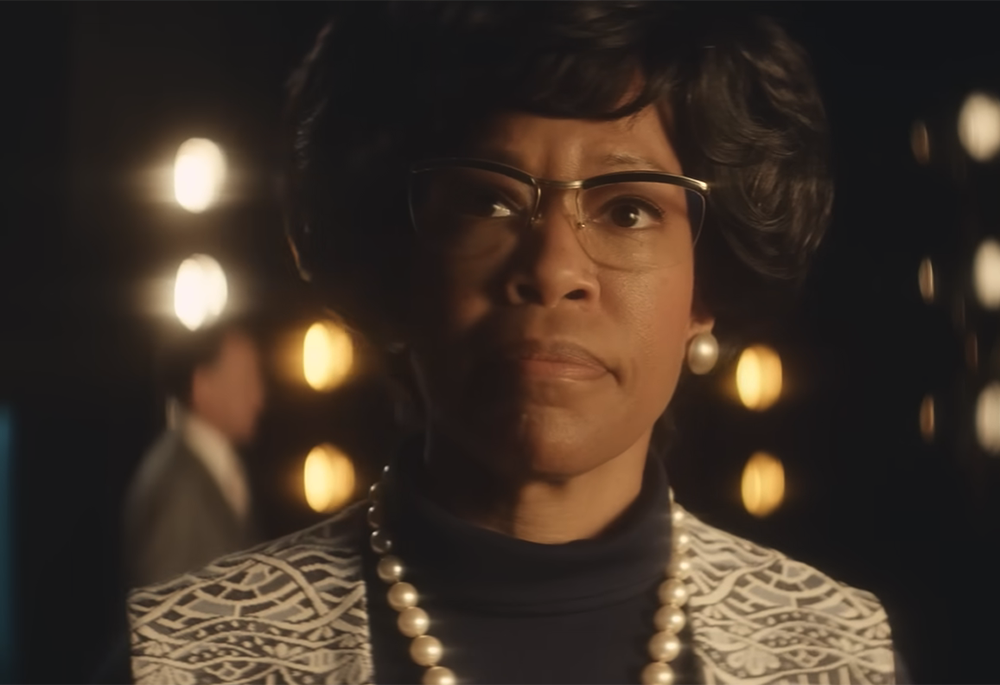
Regina King stars as Shirley Chisholm in a screenshot from the trailer for the feature film "Shirley." (NCR screenshot/YouTube/Netflix)
As the first Black woman to run for the presidency of the United States in 1972, seven-term Brooklyn Congresswoman Shirley Chisholm made way for Jesse Jackson in 1984 and, eventually, America's first Black president Barack Obama in 2008. Hillary Clinton's historic, if bittersweet, 2016 presidential campaign as the first woman to lead a major party's ticket also owes something to Chisholm. The feature film "Shirley" recalls her quixotic campaign.
Besides playing the lead, Oscar-winning actress Regina King produced the film, a 15-year-long pet project of hers and her sister and fellow actress Reina King. Having collaborated with Regina King on the ABC television drama "American Crime," Academy Award-winning screenwriter John Ridley ("12 Years a Slave") wrote and directed "Shirley." Released in theaters March 15 and on Netflix March 22, the movie is available on the streaming service.
At a 1971 Christmas party at her Brooklyn home, the first Black Congresswoman discusses a prospective race for the nation's highest office with trusted advisers: Mac Holder (Lance Reddick), fundraiser Arthur Hardwick Jr. (Terrence Howard) and her husband Conrad (Michael Cherrie). Chisholm is reminded of the promise she made to the Committee to Elect Chisholm in Florida. If they raised $5,000, she would put her name on the ballot.
The late Reddick is memorable in one of his final screen roles as Holder, who tells the congresswoman, "they raised almost $10,000," which indicates to Chisholm she should run. Mac quickly adds, however, "If you run, you can't win."
Referring to her experiences speaking on college campuses, Shirley counters: "If there are white boys who think I could be president, who think I should be president, then how am I not going to try for everybody else?"
During the campaign, in which she declared she was unbought and unbossed, Chisholm encountered greater challenges regarding her sex than her race. As she says at Mills College in Oakland, California: "We are just beginning to admit that this country has a problem with gender politics. We need to get over ourselves and redirect the priorities of this nation to make it a haven for all kinds of people."
When her staff lobby Shirley to attend the Black Liberal Convention in Gary, Indiana, Chisholm resists because women weren't invited to speak at the event. She tells her protégé and future congresswoman and Senate candidate Barbara Lee (Christina Jackson): Men are "always plotting and planning."
Most of the drama's principal characters were actual people. But Ridley introduces fictitious political operative Stanley Townsend (Brian Stokes Mitchell) to become Shirley's chief male foil as her campaign manager. Frustrated by Chisholm's unwillingness to heed his clear-minded advice, when he quits, Townsend reflects mainstream attitudes when he says: "This isn't a campaign. It's a joke. You have no organization. You have no infrastructure. … The only thing anybody is going to remember is that there were a bunch of Black folks who made fools of themselves."
The Chisholm campaign wasn't a juggernaut. Competing in a field of multiple candidates in 12 primaries, Shirley garnered more than 430,000 votes nationally, less than 3% of those cast, and 28 delegates for the Democratic National Convention in Miami. There, Democratic South Dakota Sen. George McGovern secured the nomination. The 1968 party standard bearer Minnesota Sen. Hubert Humphrey released his Black delegates to Chisholm, a symbolic move that gave her the majority of her total 152 delegate votes.
The film, to its credit, isn't interested in a hagiographic portrait of its subject. Shirley struggles with her marriage and copes with her sister Muriel St. Hill's (Reina King) resentment. Conrad, from whom she divorced in 1977, says about their relationship: "I try as hard as I can to be the man you want: attentive, and mindful. … I know all the good that you can do. So I'll be your shadow because I know, for whatever reason, a shadow of a man is what you want."
For her part, Muriel says this of her older sister: "All people do, Shirley, they talk about you. They say you're crazy." But Muriel reveals she criticizes Shirley because their father provided financially for her after his death. Nonetheless, her sister's disapproval engenders self-doubt in Shirley. "Am I crazy?" she asks future husband Hardwick. Acknowledging implicitly how difficult she is to live with, she says Conrad is "200 pounds of patience."
Advertisement
In a wonderfully complex performance, these frailties coexist seamlessly with the regal, public bearing King's Shirley projects with her voice. To achieve that effect, King de-emphasizes the lisp for which Chisholm was known and stresses her character's lilting Barbadian accent. Commanding a stage, King also masters Shirley's intimate moments. In the film's most memorable scene, Chisholm controversially visits Democratic rival and inveterate segregationist George Wallace (W. Earl Brown) in the hospital. In May 1972, at a campaign event in Laurel, Maryland, Arthur Bremer shot Wallace, leaving him paralyzed the rest of his life.
Chisholm had good cause not to visit Wallace, but having escaped an attack on her life, and as a Christian, Shirley felt compelled to go. Wallace is deeply moved when she says, "You have an opportunity to keep on how you've been or be more than what you were. And you better figure it out quick. Because the next time the Good Lord may not be satisfied with taking just half of you."
"Shirley" needed more scenes like this. Regina King's magnificent performance anchors the film, but its dramatic lulls cancel out the high points and the film struggles to maintain viewers' interest consistently. Ridley's direction falters with the content, failing to generate enough narrative momentum to fully explain why Chisholm's campaign mattered and why people supported her, and culminating in an awkward, abrupt ending.
"Shirley" could have been better, but it is doubtful that Regina King could be.






